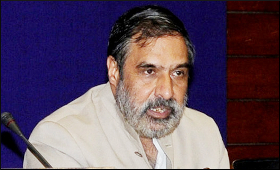|

|
Govt allows capital gains tax concessions for SME
|
|

|
| Union Minister for Commerce & Industry and Textiles, Anand Sharma addressing the meeting of State Chief Secretaries and Industry Secretaries on Manufacturing, in New Delhi on Sep 13. |
| Top Stories |
 |
|
|
|
SME Times News Bureau | 14 Sep, 2012
For the first time the Finance Ministry has agreed to allow Capital Gains Tax (CGT) concessions for investing the sale proceeds of a residential property into the productive activity of a small and medium enterprise (SME), Union Minister of Commerce, Industry and Textiles, Anand Sharma said on Thursday.
Outlining the be benefits of the National Manufacturing Policy (NMP), Sharma said, "We have been able to persuade the Finance Ministry to allow, for the first time, capital gains tax concessions for investing the sale proceeds of a residential property into the productive activity of a small and medium enterprise."
"We are pushing for allowing these concessions for the sale of landed property also and not only for residential property," Sharma said in a statement.
Adding, "Furthermore, this policy for the first time envisages creation of Technology Acquisition Development Fund which will serve as a patent pool in which industrial units will be able to seek license for a patented technology which will help them in manufacturing."
He told that the state governments were advised in advance to create land banks for the policy.
Sharma was addressing a meeting of State Chief Secretaries and Principal Secretaries (Industry) on the issue of manufacturing in the national capital on Thursday.
The minister has explained that the incentives enunciated in NMP can be availed of by any industrial cluster which is based on a model of self-regulation through a Special Purpose Vehicle. This should address the concerns of the states that are not in position to earmark the land needed for National Manufacturing and Investment Zones (NIMZs).
The Government has already notified nine such Townships along the Delhi-Mumbai Industrial Corridor (DMIC) with a minimum land area of 5,000 hectares after a strong demand from the concerned State Governments.
He also said, "For the first time, an effective single window clearance mechanism has been established for this Policy which will enable industrial units to obtain, at one place, various regulatory clearances including those relating to labour and environment."
Referring to the social dimension of the manufacturing Sharma said that neither agriculture nor services sector will be able to grow at such a rapid pace to create newer job opportunities for the aspirational youth of India. The manufacturing sector alone holds this potential to create skilled jobs for the rural youth.
National Manufacturing Policy announced in October last year aims to raise the share of manufacturing to 25 percent in the GDP and creating 100 million productive jobs in this sector within a decade.
Expressing concerns on inadequate availability of skilled manpower Sharma said that the manufacturing policy clearly addresses the gap by providing fiscal incentives for establishment of skill development institutions, it is and polytechnics by the private industry.
Sharma also emphasized the need for availability of land for industrial purpose and strongly advocated inclusion of NMIZs and DMIC and other industrial corridors such as Bengaluru-Chennai Corridor and Eastern Corridor in the definition of Public Purpose in the Land Bill.
|
|
|
| |
|
|
|
|
|
|
|
|
|
|
|
|
|
|
| |
| Customs Exchange Rates |
| Currency |
Import |
Export |
US Dollar
|
₹91.2
|
₹89.5 |
UK Pound
|
₹123.35
|
₹119.35 |
Euro
|
₹107
|
₹103.35 |
| Japanese
Yen |
₹57.9 |
₹56.1 |
| As on 22 Jan, 2026 |
|
|
| Daily Poll |
 |
 |
| What is your primary "Make or Break" expectation from the Finance Minister this year? |
|
|
|
|
|
| Commented Stories |
 |
|
|
|
|
|
| |
|